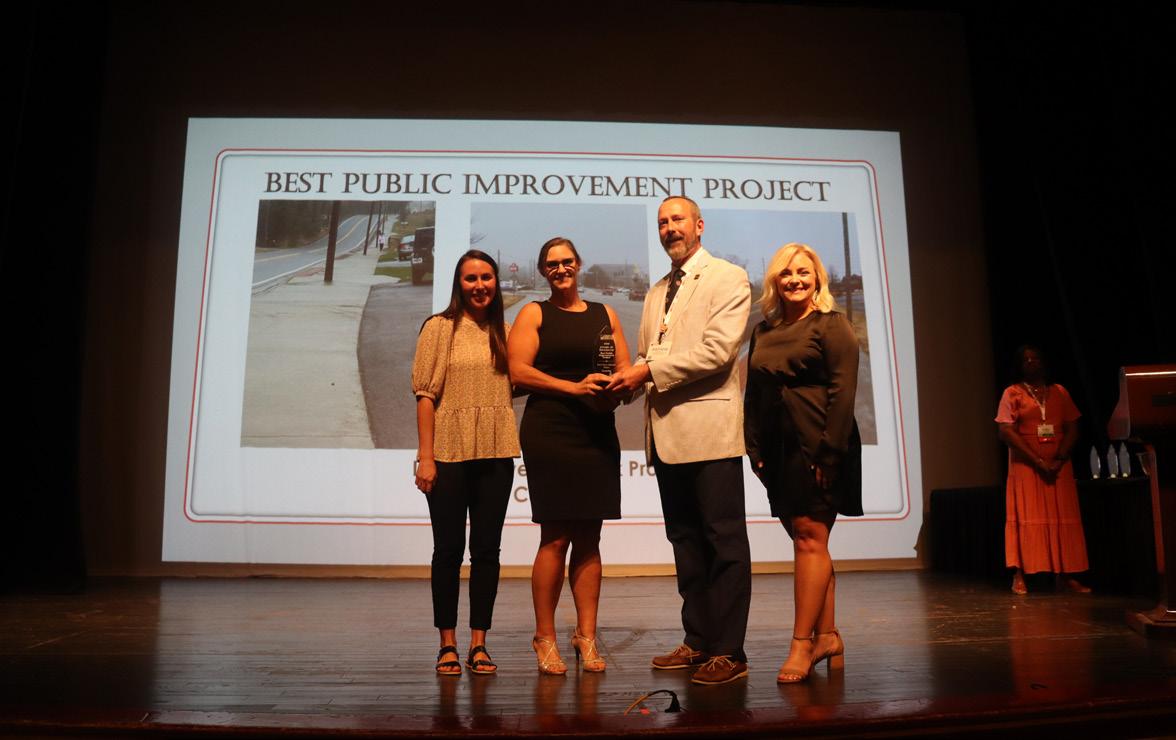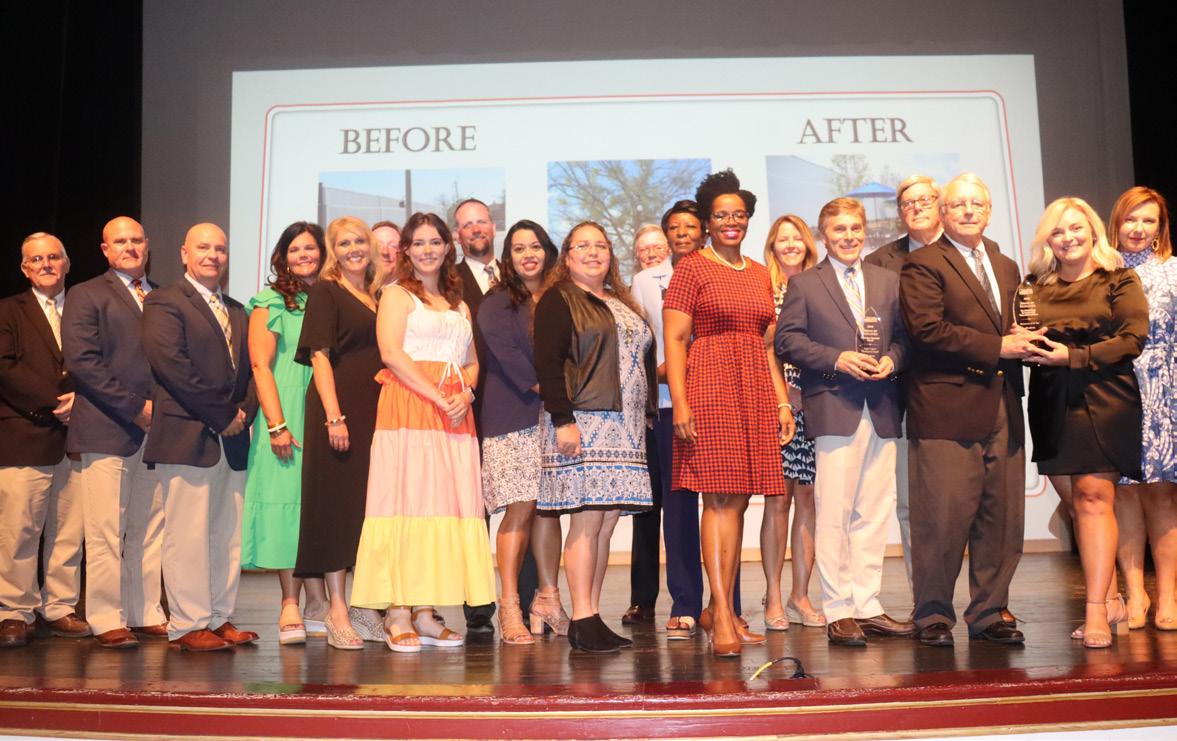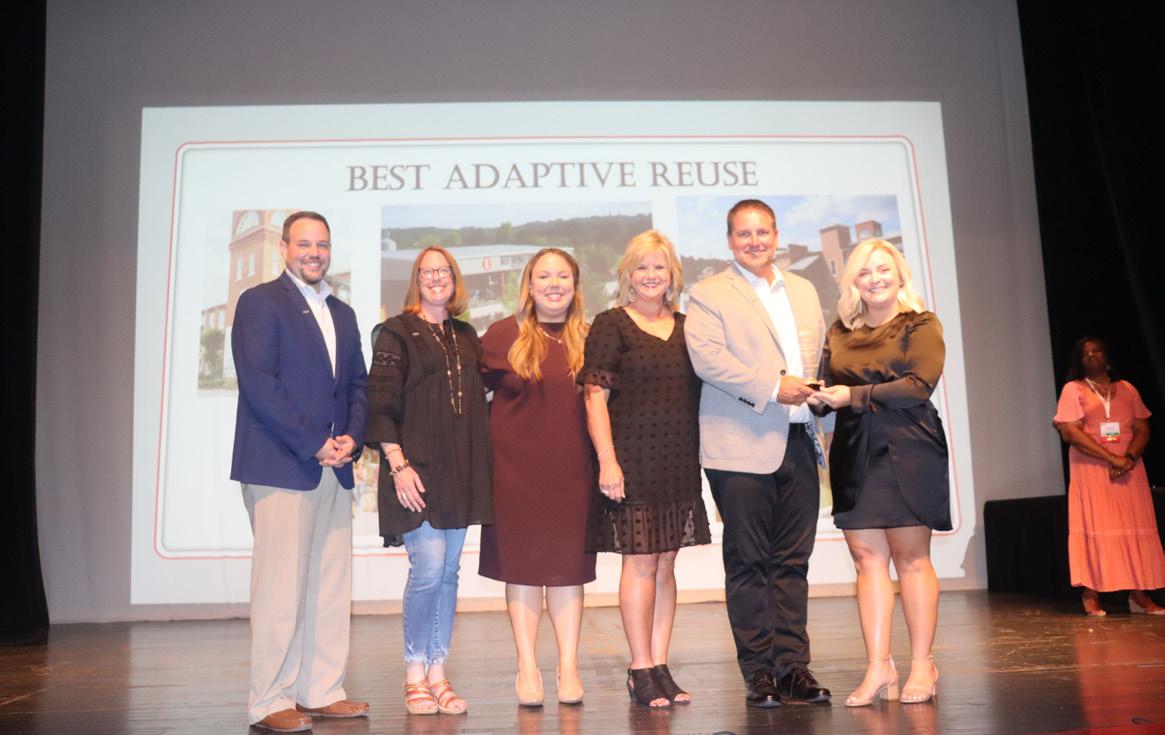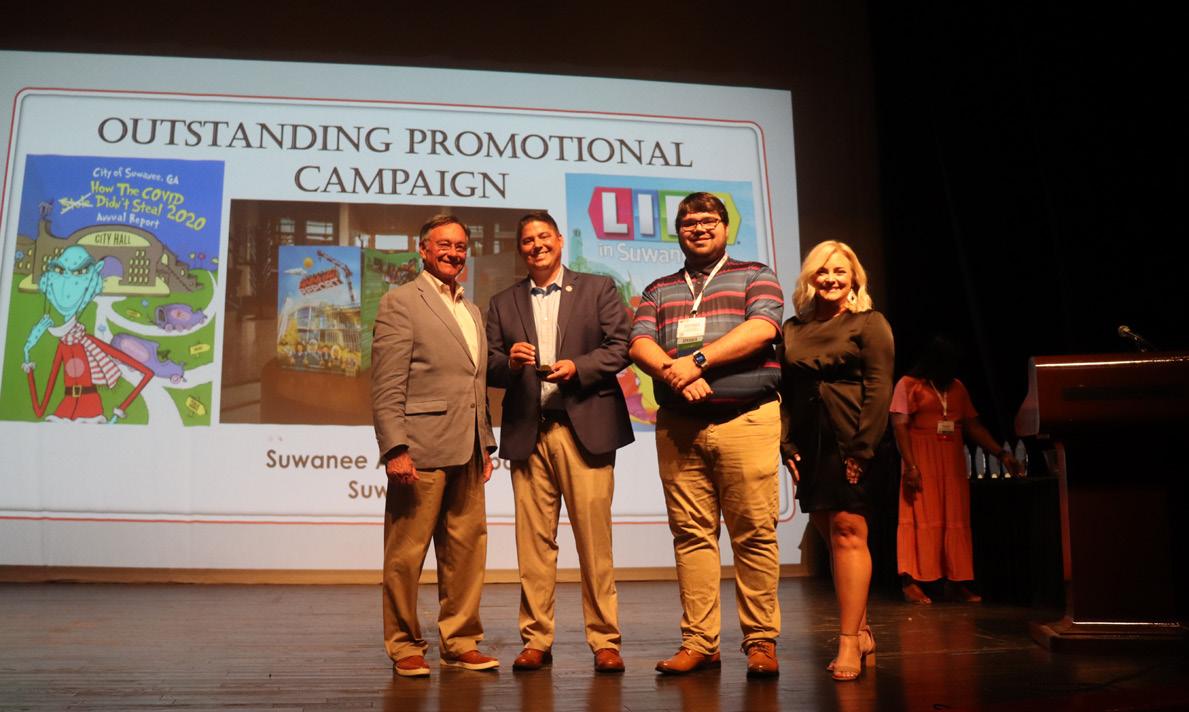
11 minute read
CITYSCAPES
Cities Are Not Broccoli
BY JULIE SMITH, GMA PRESIDENT
Advertisement
I’m going to start this editorial today with a bit of math, fractal geometry, in fact. Bear with me.
A FRACTAL IS A GEOMETRIC pattern in which the details of its structure repeat themselves at any scale. Meaning, as you zoom in, you see the structural elements re-
peat themselves.
We see fractals all around us in nature. Each branch of a tree looks similar to the branch it came from and river networks have a fractal element to them. My favorite example is broccoli, notwithstanding the first President Bush’s dislike of it. As you cut up a head of broccoli, each successively smaller piece looks like a miniature version of the original stalk.
I’m sure you’re wondering what fractals and broccoli have to do with cities. Good question. It’s this: cities are not broccoli. Cities, while similar in function and purpose, with downtowns and residential areas and street grids, are not all the same. When you zoom in and take a hard look, you see that they are quite different.
Yet, in the upcoming legislative session there will be bills introduced, as there are each year, that assume that cities are exactly the same. That the responses to the issues and challenges faced by cities should be the same state-wide, without consideration of local differences or needs, is a common perception. This point of view then moves along a predictable continuum that then necessitates the supposed need for new laws that limit the ability of cities and city leaders to address local issues in a way that best fits the circumstances of their differing communities.
The bottom line is that there isn’t just one type of city in Georgia, there are many. Cities in Georgia have different economies, demographics, geographies, revenue structures, resources and challenges, provide an array of different services at varying levels, and have different political cultures. Efforts to limit the ability of cities to address local issues and craft solutions that meet those needs is dangerous and undercuts the concept of Home Rule.
As we look toward the 2023 legislative session, we’ll likely see any number of bills introduced that would inhibit your ability to tackle the challenges your city faces in the manner that you deem most appropriate. Top-down approaches to the challenges of affordable housing, short-term rentals and homelessness, along with other issues, will be touted as opposed to allowing cities to maintain autonomy in solving local problems.
We need guideposts on how cities operate; what we don’t need are walls that impede creative thinking and local self-determination. Stay abreast of what goes on in Atlanta during the legislative session and speak to your legislators when they are considering laws that would limit Home Rule. Now, do what your mama said and eat your broccoli.
Another Successful Year for Georgia’s Cities
BY LARRY HANSON, CEO AND EXECUTIVE DIRECTOR
As 2022 comes to a close, I remain inspired by the exceptional leadership, innovative solutions and courage demonstrated by city leaders.
THROUGHOUT THE STATE, IN communities of all sizes, city officials have overcome numerous difficulties and continually risen to the occasion in support of their residents. And this is on top of the already-challenging job cities have managing their communities and finding innovative solutions to move them forward.
As the only organization representing all 537 cities, GMA takes the responsibility of partnering with our cities very seriously, and we are intentional in our focus on Legislative Advocacy, Training and Education, Programs and Services, Retirement and Insurance programs and Technical Assistance and Consulting.
One example is Legislative Advocacy. With a dedicated team of five professionals, we work on your behalf to support good legislation that will strengthen cities. We have also worked hard to defeat many pre-emption bills that harm the ability of local officials to make local decisions based on local needs in areas such as design standards, permit and inspection fees, and management and compensation for use of municipal rights of ways. We anticipate in the coming year to be very engaged in proposed legislation related to housing that poses potential threats to your decision making.
We are proud of GMA’s Risk Management and Employee Benefit programs, known as RMEBS, which offer professionally managed retirement and insurance programs to cities. In areas such as retirement, life and health, property and casualty, and workers comp, we serve between 200 and 500 cities, managing 3.2 billion dollars in assets. We are unique in that cities are our only customers, and our programs exist to serve you and meet your city’s unique needs.
Through the Georgia Cities Foundation, we work directly with member cities on downtown development projects using the Downtown Revolving Loan Program. Since its inception, the program’s $30 million in loans has resulted in over $165 million in private investment, helping to create more than 300 business and 2,000 jobs in downtowns of all sizes.
GMA also continues to advocate for cities on the federal level. We worked with Georgia’s city officials throughout 2022 to inform federal lawmakers, federal agencies, and the White House about municipal needs and priorities. We share the stories and impact of the investments you are making with ARPA, infrastructure, and other federal funding.
GMA is also dedicated to helping municipal leaders enhance their leadership skills. We’re proud to partner with the University of Georgia’s Carl Vinson Institute of Government to provide relevant and transformative training courses to city officials through the Harold F. Holtz Municipal Training Institute. In just this past year, more than 4,000 training seats were filled in over 85 classes.
Additionally, since launching the Diversity, Equity, and Inclusion training program in January 2021, we’ve reached nearly 7,000 city officials and partner organizations.
These are just a few examples of how GMA is committed to ensuring our member cities stay successful. GMA will never stop working for ALL of Georgia’s 537 cities that we are proud to call members. Because together, we are CITIES UNITED!
Congratulations 2022 Georgia Downtown Association Award of Excellence Winners!
Best Public Improvement Project: Cornelia – Level Grove Sidewalk Project
Outstanding Community: Transformation – Downtown of the Year Moultrie Premier Partner: Warrenton - Area Children’s Theatre, Inc.


Premier Special Event: LaFayette - The Honeybee Festival (Co-winner) Premier Special Event: Moultrie – Lights! Lights! Thanksgiving Night! (Co-winner)



Best Placemaking Project: Thomasville – Flaunt 2022: Let’s Play! Best Façade Rehabilitation: Monroe – The Roe

Best Adaptive Reuse: Canton – The Mill on Etowah (Co-winner) Best Adaptive Reuse: Newtown Macon – Hotel Forty Five (Co-winner)


Main Street Hero: Hartwell – Peggy Vickery Best Creative Fundraising Effort: Rome - Downtown Dog Stations


Creative New Event: Suwanee – Atlanta International Night Market - Glow in the Park Outstanding Promotional Campaign: Suwanee – Suwanee Annual Report



This editorial originally appeared in the Fall 2022 issue of The Georgia Police Chief. It has been edited and condensed for publication in Georgia’s Cities. To read the original story, visit gachiefs.com/newsletter
TRAFFIC ENFORCEMENT OR REVENUE ENHANCEMENT?
Improvements in vehicle technology and road construction have played a critical role in reducing the frequency and severity of automobile collisions. Police officers’ traffic enforcement initiatives have also served as a critical component in making the roads and highways safer across the nation. Studies have found that more traffic citations correspond with a lower rate of car crashes.
DESPITE THIS, CRASHES CONTINUE TO BE A LEADING CAUSE OF unintentional deaths in the United States. The National Highway Safety Traffic Safety Administration (NHSTSA) reported traffic fatalities in 2021 increased by 10.5%, reaching a 16-year high.
While the overwhelming majority of police officers’ efforts have been focused on improving public safety and reducing collisions, there is the perception that some communities have used traffic enforcement to overcome revenue shortfalls. This had led to police agencies across the nation to be accused of “policing for profit.” As articulated in the Official Code of Georgia, the standard to evaluate law enforcement agencies’ traffic enforcement efforts is to determine if it is being done for “the promotion of the public health, welfare, and safety.” Traffic enforcement strategies being employed by a few agencies can reduce all law enforcement agencies’ legitimacy in the public eye. Luckily, there are processes that leaders can utilize to ensure their organizations’ focus on public health, welfare and safety, as well as insulate their department against inaccurate allegations.

TRAFFIC CITATION PRACTICES
A nationwide study conducted by Governing magazine found that “fines and forfeitures accounted for more than 10 percent of the general fund revenues for nearly 600 jurisdictions.” In more than 80 governments across the U. S., fines accounted for more than 50% of their general revenue funds. Georgia was one of the top six states with the most local governments receiving higher traffic fines.
A variety of common behaviors have been associated with agencies that conduct traffic enforcement to enhance revenue.
Several studies have noted local officials use traffic fines and forfeitures to overcome revenue shortfalls. Increased per capita fines are more likely to occur in rural and low-income counties.
Traffic enforcement fines may also shift the burden from residents to non-residents. This approach is sometimes referred to as “tax exporting.”
When the approach is applied to traffic enforcement, researchers have found out-of-town drivers may be scrutinized more closely.
For example, Massachusetts state law limits municipalities’ ability to increase property taxes and excise fees. Researchers found that in those communities that did not pass a referendum to override this restriction, agencies were more likely to issue citations and fine persons who live outside the jurisdiction. Such that, out-of-state drivers had a 66% greater chance of receiving a citation as compared with a local driver, who had a 30% chance.
POLICE LEGITIMACY
One of the nation’s founding principles is that governments, and subsequently their agencies, derive their authority from the consent of the governed. As the most visible providers of governmental services, law enforcement officers are often seen as the face of local government.
The issue of agencies conducting traffic enforcement for the purpose of enhancing revenue is one that elected officials from the political left and right unite to address. As a result, state legislatures have often placed increased restrictions on local governments to curb the perceived abuses.
Georgia has a long history of some local agencies engaging in traffic enforcement strategies perceived as inappropriate. State highways and interstates are heavily used by tourists traveling to and from vacations in Florida. In 1970, after he was unable to persuade community leaders to cease their traffic enforcement strategies, Gov. Lester Maddox gained national attention when he posted a billboard along U.S. 301 warning drivers of a speed trap. Maddox supported legislation prohibiting the use of speed detection devices by officers who were paid on a fee system. Over time, more restrictions were placed on local law enforcement agencies through legislation, resulting in Georgia having some of the most restrictions on traffic enforcement in the U.S.

PROCESSES TO CONSIDER WHEN CONDUCTING TRAFFIC ENFORCEMENT
While automated vehicle technology may one day eliminate the need for traffic enforcement, it will continue to be an essential function of police agencies for the foreseeable future. It is critical for police leaders to know those areas the agency and its officers may be criticized and use data to support their enforcement initiatives.
Track Traffic-Related Complaints - When the agency receives traffic-related complaints from citizens, a record should be created. In some cases, it may be productive to conduct speed studies to verify the claims. These traffic surveys can help to better determine the time and day of week events may be occurring so officers can focus their efforts during times they are more likely to occur. This information is critical when concerns are voiced about officers conducting enforcement.
Analyze Collision Data - Conduct regular analysis of the time, day, locations, and contributing factors for automobile collisions. Agencies that participate in electronic reporting to the Georgia Department of Transportation can access automated vehicle collision data from Lexis Nexis GEARS to easily evaluate these issues. Using this information, department leaders can focus valuable resources at hot spots for vehicle collisions during the most appropriate times. Officers should also be able to explain why they are conducting traffic enforcement initiatives at specific locations and times.
Analyze Fines/Forfeitures - Conduct periodic analyses of traffic citation fines and forfeitures as compared with the department’s budget and state limitations. Also look for any patterns of officers issuing traffic citations for non-speeding violations to avoid being tracked for these violations. As part of this, agencies may consider examining detailed information such as the drivers’ residence, race, issuance of warnings and citations. This information should be examined for the department, shifts, and particular officers for any potential patterns of abuse or misconduct.
The overwhelming majority of law enforcement agencies and officers work very hard to serve their communities. However, a profession is often measured not just by its best individuals and organizations. Rather, it is the actions of a very few who consistently perform at the cusp of the minimum standard who establish the benchmark through stricter legislation and court rulings.
This is a time for all police officers to ensure our collective behaviors are viewed in accordance with the consent of the governed. Failure to do so will result in diminished legitimacy and more restrictions from our governing bodies and the courts.

